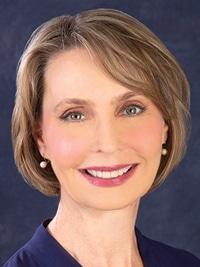What you’ll get from the Leadership Summit
Emily E. Volk, MD
April 2022—The end of this month marks the start of one of my favorite CAP events: the Pathologists Leadership Summit. If you’re not familiar with it or haven’t signed up to attend, I’d like to give you a sense of why it’s so important.
Back in the early 2000s, I attended what was known as CAP Advocacy School. At that point in my career, I had seen many physicians who felt discouraged, frustrated, and helpless about the state of physician payments and government health care regulations, and I understood those feelings. Advocacy School offered a solution. What struck me about this program was the message that we were not powerless. Through this meeting, the CAP taught me that my government representatives would be interested in what I had to say as an expert physician. I was partnered with Richard Hausner, MD, a seasoned pathologist advocate. Through his passion and charisma during our Capitol Hill visits, he showed me and another pathologist also new to advocacy at the time, Patricia Gregg, MD, how to make our voices heard. Dr. Gregg and I were hooked after that Hill Day.
In the mid-2000s, I also got involved in the CAP House of Delegates. I loved the opportunity to network with CAP fellows from across the country and hear the challenges they faced in their practices and how they found solutions.
The CAP Pathologists Leadership Summit combines the best from Advocacy School, the CAP Policy Meeting, and the CAP House of Delegates into an experience that is more than the sum of its parts. At this forum, fellows learn how to frame our concerns in a way that’s concise, effective, and meaningful to congressional staff, health legislative assistants, representatives, and senators. As pathologists, our experiences inform the CAP’s advocacy agenda. Those points of view are honed into powerful messages that resonate with policymakers and governmental leaders. Our CAP advocacy team looks at how those messages fit into the larger context of what’s happening in government and finds ways to align them with other initiatives that already have momentum.

Dr. Volk
The CAP advocacy team has expertise that we pathologists typically do not. They know how the back hall conversations happen on Capitol Hill. Our lobbyists develop long-term relationships with congres-sional staff, building a rapport and trust with the people who most need to hear what we have to say. They also work with our fellows to help them nurture the kind of legislation-changing relationships that have an impact on our daily practice.
At the summit, I continue to learn that we have something to offer these representatives because of our expertise. As pathologists, we touch all parts of medicine. Our generalist background means that when people in government have questions about medicine—any area of medicine, not just pathology—we can be allies to help them better understand health-related issues and how policy changes might affect doctors. As we develop relationships with members of Congress, they realize these are not transactional relationships but long-term partnerships. When we pick up the phone or write an email, they trust us and they’re ready to listen. This is an incredibly powerful way to help our patients and our practices.
It is also a way to help ourselves. I see going to Capitol Hill or to our state governments to share our expertise as pathologists as an opportunity to participate fully in our representational democracy. This is a hopeful thing to do, especially these days when things can seem very partisan. When we meet politicians as people, public servant to public servant, it is an optimistic perspective for our democracy.
For me, connecting with other members of the CAP, like Dr. Gregg and Dr. Hausner, and sharing our concerns with officials in government has been an antidote to feelings of hopelessness and burnout. It allows me to see that I’m making a real difference, rather than just pounding my fist on the table in the doctors’ lounge or cursing at Twitter.
The skills you learn at the summit also translate to your everyday work. Whenever you learn to speak truth to power, that can be useful in your practice, with your colleagues, with your hospital administration, or with the other leaders in your corporation. It can be helpful in working with clients. I truly believe that any communications skills we gain have the potential to provide a positive impact across every aspect of our lives.
I encourage you to consider participating in this event. It’s a hybrid meeting this year, from April 30 to May 3, so if you can’t make the trip in person you can do it from the comfort of your living room. The congressional visits will be virtual, which we did last year as well and were successful. We always pair people up for these calls—almost like a buddy system—so no one has to do this without support. I hope to see you there.
Dr. Volk welcomes communication from CAP members. Write to her at president@cap.org.